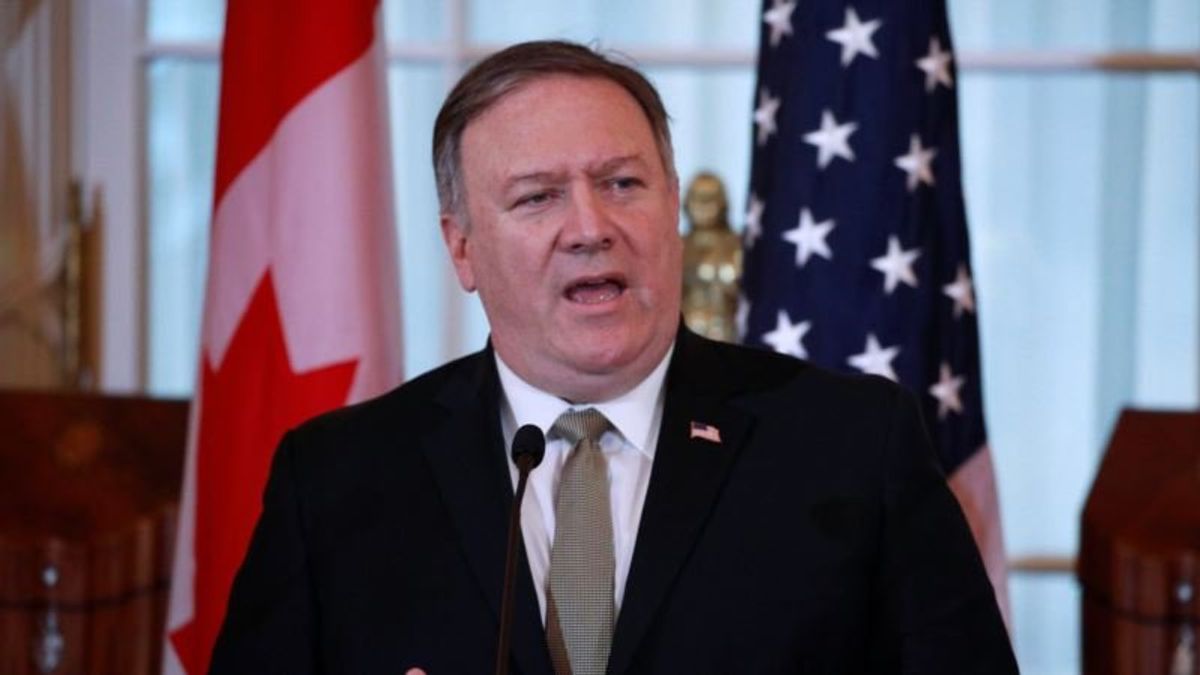
Pompeo: US to Hold Saudi Journalist’s Killers Accountable
Pompeo: US to Hold Saudi Journalist's Killers Accountable

U.S. Secretary of State Mike Pompeo said Friday that he had noted the historic rebuke of longtime ally Saudi Arabia by U.S. lawmakers.
The U.S. Senate on Thursday passed a resolution to end American support for the kingdom's military intervention in Yemen's civil war and another measure condemning the killing of a dissident Saudi journalist.
"We saw the vote yesterday. We always have great respect for what the legislative branch does," Pompeo told reporters in Washington. "We're in constant contact with members on Capitol Hill so that we understand fully their concerns and do our level best to articulate why our policies are what they are."
"President Trump is determined to make sure that we protect America, all the while holding accountable those who committed the heinous murder of Jamal Khashoggi," Pompeo added during a joint press briefing with Defense Secretary Jim Mattis and their Canadian counterparts at the State Department.
After hours of passionate debate Thursday, the Republican-led Senate voted 56-41 to approve the first resolution. Moments later, it adopted the second resolution by a voice vote. In both cases, the chamber acted in defiance of the Trump administration, which has strenuously argued against a rupture of cooperation between Washington and Riyadh.

"Yemen is now experiencing the worst humanitarian disaster in the world," Vermont independent Sen. Bernie Sanders said. "The United States has been Saudi Arabia's partner in this horrific war. We have been providing the bombs that Saudi Arabia is using, refueling the planes that drop those bombs and assisting with intelligence."
7 GOP votes
Seven Republicans joined a unified Democratic caucus in backing the initial Yemen-related resolution, which asserts Congress' constitutional duty to declare war and approve prolonged U.S. military engagements. The U.S. legislature has not authorized America's support role in Saudi Arabia's campaign to combat Iranian-backed Yemeni rebels, a conflict that has led to widespread civilian deaths.
But some argued that, in this instance, the case for asserting war powers authority is weak.
"The United States is not involved in combat [in Yemen]. It is not dropping ordnance. It is no longer even providing air-to-air refueling [for Saudi warplanes]," Republican Majority Leader Mitch McConnell of Kentucky said. "If the Senate wants to pick a constitutional fight with the executive branch over war powers, I would advise my colleagues to pick a better case."
WATCH: US Senate Votes to End Support for Saudi War Effort in Yemen

 Embed share
Embed share
US Senate Votes to End Backing for Saudi War Effort in Yemen
Embed share The code has been copied to your clipboard. width px height px
- Share on Facebook
- Share on Twitter
The URL has been copied to your clipboard
No media source currently available
0:00 0:02:16 0:00 Direct link
- 270p | 6.5MB
- 360p | 9.1MB
- 720p | 59.2MB
- 1080p | 44.5MB
"If we set the precedent that even an operation such as the refueling of aircraft of allied countries needs congressional authority, we would severely limit the executive branch's ability to respond to international crises and safeguard our global national security interests," Alaska Republican Dan Sullivan said.
That argument did not sway resolution co-author Mike Lee, a Utah Republican, who countered that direct U.S. support for Saudi military actions constitutes unambiguous involvement in the war in Yemen.
"We're involved in this conflict as co-belligerents [with Saudi Arabia]," Lee said.
Largely symbolic
While the Senate resolution sends a strong signal of displeasure to Saudi Arabia, it is likely to stand as a largely symbolic gesture for now. Swift House action became less likely after the chamber advanced a rule blocking a vote on any war powers resolution relating to Yemen for the remainder of the current Congress.
"You look at the humanitarian crisis in Yemen today, and it wasn't started by the Saudi air campaign," Illinois Republican Rep. Adam Kinzinger said. "It was started by the Houthi rebels and denial of access for food overthrowing the legitimate government."

Congressional ire toward Saudi Arabia had been simmering for years as Yemen's civil war dragged on with ever-higher civilian death tolls. Anger spiked sharply after dissident Saudi journalist Khashoggi was killed at the kingdom's consulate in Turkey two months ago.
The second resolution approved by the Senate blames Saudi Crown Prince Mohammed bin Salman for Khashoggi's death, expresses support for Yemeni peace talks and states: "There is no statutory authorization for United States involvement in hostilities in the Yemen civil war."
Trump notes Riyadh denials
President Donald Trump has said that responsibility for Khashoggi's death remains an open question, and noted Riyadh's repeated denials that the kingdom's crown prince played a role.
Trump's critics in the Senate slammed the White House's posture.
"This administration is putting the Saudi government on a pedestal that stands above American values," New Jersey Democrat Bob Menendez said. "They continue to extend a blank check to certain players within the Saudi government, no matter how brazen their actions."
Wayne Lee contributed to this report.
 McCain Replacement Senator Jon Kyl Resigning at Year’s EndNext PostTrump Names Mulvaney Acting Chief of Staff
McCain Replacement Senator Jon Kyl Resigning at Year’s EndNext PostTrump Names Mulvaney Acting Chief of Staff







